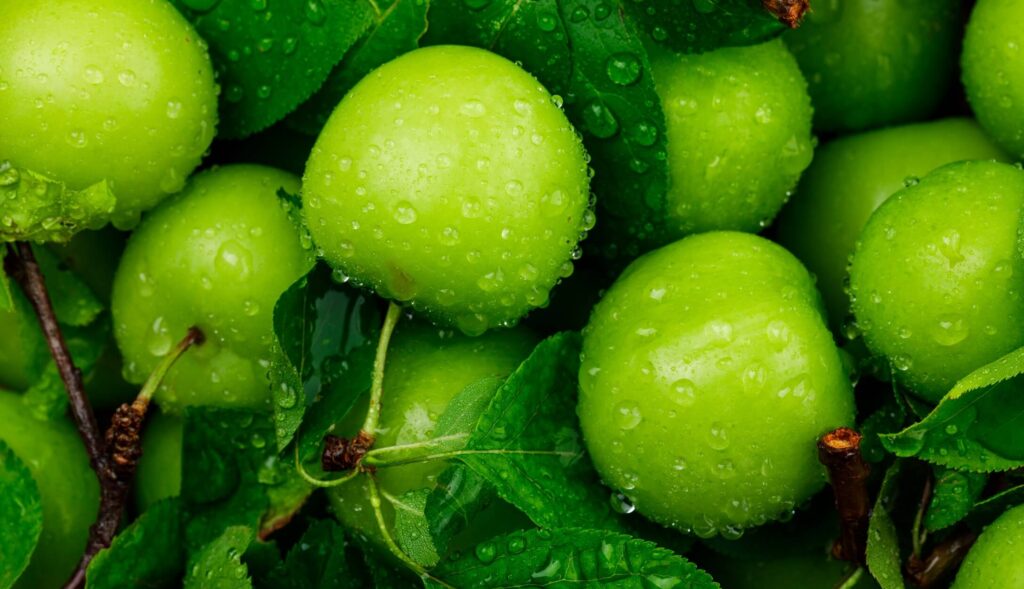A fruit tree native to some parts of Asia is called amla, or Indian gooseberry. Particularly in India, it has a variety of culinary and herbal medicinal uses. The vitamin C-rich fruit of the Indian gooseberry tree is well-known for its potential heart-protective and antioxidant qualities. The healing properties of Indian gooseberry berries have led to their use in medicine. Indian gooseberry is a tiny, rounded berries with a yellowish-green color. Indian gooseberry has a variety of distinct flavors, including “pungent,” “astringent,” “sweet,” “bitter,” and “sour.” This article review 12 amazing health benefits of Indian gooseberry, and disadvantages, and how to use them.
What is Indian gooseberry?
Indian gooseberry or amla is an ancient super fruit used in Indian traditional medicine. Indian gooseberry berry fruit grows on a flowering tree with yellow-green flowers, which are round, edible, golf-ball-sized, with a pit and thin peel. Indian gooseberry berries have a sour, bitter, astringent taste and are used in Indian cuisine. Today, most supplements are made from powders, dried fruits, or fruit extracts. However, the entire plant, including the fruit, leaves, and seeds, is utilized in Ayurveda medicine. Historical records indicate that it has been practiced for at least 1000 years.

Nutrients of Indian gooseberry per Serving:
A serving of a half-cup contains 33 calories, 8 grams of carbohydrates, 3 grams of fiber, and 0 grams of sugar. Indian gooseberry berries are a great source of antioxidants, which help to reduce your risk of chronic diseases such as Heart disease, Diabetes, and Cancer. Amla berries are also a great source of vitamin A, vitamin C, and vitamin E, as well as iron and calcium. Since fresh Indian gooseberry berries have a high fiber content and low sugar content, they are a great addition to any snack or meal recipe.
12 amazing health benefits of Indian gooseberry:
Indian gooseberry has several potential benefits, although more high quality studies in humans are needed to confirm many of these possible effects. Here are 12 amazing health benefits of Indian gooseberry or amla:
1. Heartburn
A 1000 mg daily dose (mg) of Indian gooseberry fruit tablets (2) was found to be more effective in relieving GERD symptoms in patients with heartburn compared to a placebo group. In addition, the Indian gooseberry fruit group had a greater reduction in the frequency and severity of heartburn and vomiting compared with the placebo group. Further research is needed to fully understand the effects of Indian gooseberry supplements on GERD symptoms and heartburn.
2. Skin health
India gooseberry, is a natural blood cleaner, and regular intake of these products can help to improve your skin’s glow. Amla products also help to fight various skin allergies. the Indian gooseberry has antioxidant properties, and it can also help to prevent the degradation of collagen. Collagen is a protein matrix that forms a firm but flexible structure in the skin and other soft tissues.
3. Hair health
India gooseberry is used as a long-term home remedy to improve the growth of hair. Amla oil stimulates hair follicles for better hair growth, which help Hair length and hair volume improvement. Indian gooseberry contains vitamin C which helps in increasing collagen levels. Vitamin C directly affects hair growth by replacing the dead hair cells. Indian gooseberry also helps in preventing dandruff issues by keeping the scalp hydrated. Amla helps in reducing the pitta in order to retard the hair greying process. This is why Amla is used in various hair colorants formulations.
4. Healthier Eyes
Indian gooseberry is a good source of vitamin A which is known to improve eye health. This can help to reduce the risk of Macular degeneration and the conjunctivitis that comes with ageing. The vitamin C content in Indian gooseberry helps to improve your eye health by fighting off bacteria. This helps to protect your eyes against conjunctivitis and other infections.

5. Cancer
Indian gooseberry extracts have been shown to kill cancer cells in test-tubes and in animals. Indian gooseberry extracts may also play a part in cancer prevention because of their antioxidant activity. Indian gooseberries may also help to prevent cell mutations that cause the growth and development of cancer cells. It is thought that many of the phytochemicals in Indian gooseberries (e.g. tannins, flavonoids) play an important role in cancer prevention. Unfortunately, there is no human research on the effects of Indian gooseberry on cancer, so this benefit is far from proven.
6. Blood sugar levels
Indian gooseberry can help lower your blood sugar levels in animal studies. In a study of few people, 1–3 g of Indian gooseberry powder daily was found to significantly reduce fasting and post meal blood sugar levels. Amla has been used for centuries as a home remedy for diabetes control or prevention. Stress is the main cause of diabetes. Indian gooseberry is packed with vitamin C which is a powerful antioxidant that can counteract the effects of oxidative stress.
Regular consumption of Indian gooseberry products can help lower your risk for diabetes. The soluble fiber in Indian gooseberry helps slow down your body’s rate of sugar absorption, which helps to prevent blood sugar spikes. However, more research is needed in humans.
7. Liver damage
Indian gooseberry extract has been shown to protect against liver damage in rats, which can be caused by consuming a high-fat diet or consuming a high-potency metabolite that is toxic to liver cells. This is thought to be due to its antioxidant and anti-inflammatory properties, but this effect has not been studied in humans.
8. Immune health
Indian gooseberry may also have anti-inflammatory and immune-boosting properties. Vitamin C is an antioxidant that works to reduce cell damage and inflammation. Short-lived inflammation is a healthy immune response. Long-lasting inflammation is a chronic immune response that promotes poor health. Chronic inflammatory conditions are linked to a higher risk of developing diseases such as type 2 diabetes and heart disease, as well as autoimmune disorders.
One 100g serving (about 1/8 cup) contains 300mg vitamin C, which is more than twice the recommended daily intake for adults. Indian gooseberry berries contain polyphenols and alkaloids. They also contain flavonoids and antibacterial properties.
9. Hypertension
Indian gooseberry is rich in antioxidants, which are known to help remove free radicals from the body during stress. In addition to antioxidants, Amla also contains a large amount of potassium. Potassium is known to control blood pressure, which is why it is commonly used in the diet of people with blood pressure issues. The main way potassium controls blood pressure is by dilating the blood vessels, which reduces the risk of high blood pressure. In such a situation, drinking Indian gooseberry juice may be beneficial.
10. Better digestion
Indian gooseberry berries contain soluble dietary fibers that help the body to regulate bowel movements. This may help to reduce symptoms of conditions such as irritable bowel syndrome (IBS). Vitamin C in Amla helps your body to absorb other nutrients, which may be beneficial if you are taking iron and mineral supplements. Vitamin C in amla berries has synergistic effects with various health supplements.

11. Heart health
Indian gooseberry has many uses, but one of the most popular is to improve heart health. Here are some of the ways Indian gooseberry can help reduce your risk for heart disease:
Normalizes blood fat levels – Human studies have observed improved blood fat profiles after supplementing with Indian gooseberry, including lower triglyceride and total and LDL (bad) cholesterol, besides increased HDL (good) cholesterol.
Antioxidant effects – Indian gooseberry extracts may protect against oxidative damage that’s associated with heart injury.
Anti-platelet effects -Supplementing with Indian gooseberry may help prevent the formation of blood clots, which may cause a heart attack or stroke if they block an artery.
Anti-inflammatory effects – Human studies have noted that Indian gooseberry can significantly reduce inflammation, which is considered a key factor in the development of heart disease.
12. Other benefits:
Reduces blood pressure:
High blood pressure is one of the risk factors for heart disease. Indian gooseberry may help lower your blood pressure by acting as vasodilator or by widening your blood vessels.
Memory and Brain Health:
The antioxidant and phytonutrient properties of Indian gooseberry help to enhance memory by blocking the effects of free radicals on brain cells. High levels of vitamin C in indian gooseberry may also stimulate the body to produce norepinephrine.
Mental health:
Indian gooseberry berries contain powerful antioxidants that block free radicals, which can help protect brain cells from harm and improve memory.
Weight loss:
One of the reasons for the fat accumulation is the slow metabolism. The fat accumulates in different places due to bad eating habits. Indian gooseberry stops the formation of the fat and helps in the elimination of the toxins from the body. The most effective way of losing weight is consuming raw amla, amla candy, amla powder and luke warm water.

Potential side effects and risks:
Getting fresh Indian gooseberries can be difficult unless you live near an Indian or Asian specialty market. However, you can still purchase dried Indian gooseberries on the internet. Taking Indian gooseberry as a supplement may also cause side effects, as follows:
- Indian gooseberry can thicken your blood and stop normal blood clotting. If you are bleeding disorder or taking blood thinner, consult your healthcare provider before consuming, drinking, or taking Indian gooseberry.
- You should also avoid taking Indian gooseberry before surgery due to the bleeding risk.
- There is some evidence that Indian gooseberry may reduce blood sugar levels in people with type 1, type 2 diabetes, or other blood glucose management conditions.
- Since there is no clear evidence of its safety, Indian gooseberry should not be consumed by pregnant women, breastfeeding women, or those trying to conceive women.
- The dosage of Amla juice can lead to dryness of the skin.
- Amla should be avoided during coughing problems.
Indian gooseberry products and their recommended dosages:
Different forms of Indian gooseberry products:
| Product | Preparation | Dosage/ Day |
| Powder | Take ½ teaspoon of Amla powder with lukewarm water. | 2 times |
| Capsule | Take 1 – 2 Amla capsules with excess water after meals. | 2 times |
| Tablet | Take 1 – 2 Amla capsules with excess water after meals. | 2 times |
| Candy | Take 1 – 3 Amla candies after meals. | – |
| Juice | Take 3-4 teaspoons of Amla Juice before taking food. | 2 times |
How to use Indian gooseberry?
Indian gooseberry fruit can be consumed raw, but it is very sour and not for everyone. In India, Indian gooseberries are often picked and candied in simple syrup, and some regions of India use them in a lentil dish called dal.
Most Indian gooseberry supplements come in a powder or capsule form, and you can use it to make tea, add it to drinks, or add it to smoothies. The powder usually contains between 500 and 1,000 mg per serving, and because it is high in vitamin C, many supplement companies advertise it as a hair or skin care product.
You can also purchase Indian gooseberry fruit oil, which is specially formulated for skin and hair care. It is important to note that there is limited research on the safety and effectiveness of using Indian gooseberry supplements, so it is best to stick to the recommended daily dosage.
Additionally, it is important to consult with your healthcare provider if you are taking blood thinners or medications for diabetes.
Conclusion:
Indian gooseberry is used as a food ingredient in Indian cuisine and as an herbal medicine in Asian countries. Indian gooseberry supplements contain many possible benefits, such as anti-aging and anti-cancer benefits, reducing heartburn and heart-healthy effects. Indian gooseberries are rich in vitamin C, which may help improve your immune system. Unfortunately, there is little research on the safety and effectiveness of Indian gooseberries in humans. Therefore, you should not take more than what is recommended on the label of your supplement. Always consult your doctor before adding any supplement to your routine.
FAQ
Can Indian gooseberry help in boosting the immune system?
Indian gooseberry is an excellent source of Vitamin C and Antioxidants, which are essential for building and strengthening your immune system. Consuming Indian gooseberry regularly can help improve your immune system, which can help protect you from infections and diseases.
What are the health benefits of Indian gooseberry?
Indian gooseberry (also called Amla) is an excellent source of vitamin C and antioxidants, as well as polyphenols. It helps to improve your immune system, skin, and overall health. It also has anti-inflammatory benefits and helps with digestion, making it a great addition to any healthy diet.
How does Indian gooseberry contribute to hair health?
Indian gooseberry is rich in vitamin C, which helps to increase collagen production, which is essential for hair growth and elasticity. Indian gooseberry also contains antioxidants that help protect against hair loss, promote hair growth, and improve overall scalp and hair follicle health.
Are there any side effects associated with consuming Indian gooseberry?
Indian gooseberry is generally safe to eat, but consuming too much can cause digestive issues like diarrhea or stomach cramps due to the high fiber content of the berries. It is best to consume Indian gooseberry in moderation and talk to your doctor if you have any worries or health issues.
What nutrients and antioxidants are present in Indian gooseberry?
Indian gooseberry is packed with vitamins C, A, potassium, fiber, and other essential nutrients. It also contains powerful antioxidants, such as polyphenols, flavonoids, and other antioxidants, which can help boost your immune system and reduce oxidative stress.
Reference used:
https://www.healthline.com/nutrition/indian-gooseberry#what-it-is





